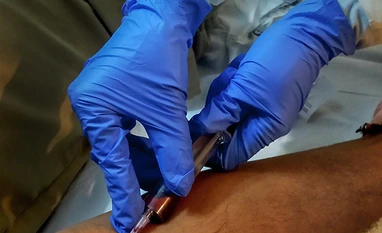The government is planning to expand testing facilities to the hinterland after a large number of migrant labourers returned home. Of the two options being considered, according to sources, one is to upgrade local labs and allow collaborations with large national diagnostic chains and, the other, is to install RT-PCR machines at medical colleges across the country. A quick look at the approved testing labs shows that most are concentrated in big cities or in developed districts. India is testing roughly 140,000 samples per day for Covid-19, but most of it is happening at urban centres. Even big diagnostic players do not have high-end testing labs in every state.
Metropolis Healthcare, for example, is processing Covid-19 samples from Assam and Jharkhand at Delhi. Samples are being flown in from these states, which takes 24 hours or so. As such, patients wait for over 72 hours for reports. Ameera Shah, promoter and managing director of Metropolis, said if flight connectivity for sample movement was enhanced, the testing turnaround time can improve significantly.
As the need to expand testing to smaller towns and villages emerge — more so, as India relaxes curbs on movement and industries woo labourers to get back to work — there is a need to re-look at the testing strategy. So, why would not all states have reverse transcription polymerase chain reaction (RT-PCR) machines at the central labs that diagnostic chains have there?
None of the diagnostic chains have RT-PCR machines across all states. These are present in their labs in New Delhi, Mumbai, Pune, Bengaluru, Chennai, etc. Shah said states such as Assam, Madhya Pradesh, Bihar, Jharkhand, Rajasthan, and others will have a big challenge as they don’t have PCR testing labs. Even a large state like Uttar Pradesh says diagnostic chains don’t have RT-PCR test labs, as there were not enough volumes for such tests before the Covid-19 pandemic.
RT-PCR tests are used to test for HIV, Hepatitis, tuberculosis, dengue, etc. RT-PCR technology can count the number of viruses in blood. A RT-PCR kit is used to collect the sample, extract the virus RNA for the test and then the test is run on an RT-PCR machine.
Shah said setting up an RT-PCR lab from ground up would take about a month or two and then getting it approved by the Indian Council of Medical Research (ICMR), and the National Accreditation Board for Testing and Calibration Laboratories (NABL) would take another month. She said, until now, national chains are not allowed to collaborate with local labs for collection of samples.
But the government is now considering allowing collaborations between national chains (who have RT-PCR machines) with local small diagnostic companies who have manpower to do sample collection. A government official said the Centre is considering several options to expand testing in a short time. "The finance minister spoke about having diagnostic labs at block level. We are talking with industry bodies, too, to take their views on the road ahead," said the official.
According to experts, if the government gives permission, large labs can expand to smaller districts quickly as they have installed capacities. "Collection will need to be done by local labs. Technicians can be trained to collect swab samples," they said.
Harsh Mahajan, senior vice-president, Nathealth, and founder & chief radiologist Mahajan Imaging, said such collaborations should be allowed and local unroganised players should be accredited to collect samples. He said Nathealth is likely to take this up with the government soon.
He also said NABL has been working overtime to accredit labs. His genomic lab in Delhi that had an RT-PCR machine was accredited for Covid-19 testing within a week of applying.
The other option being considered is that the government hospital staff collect samples and deliver them to private labs for testing, sources said. Manpower training is required here, too.
The government is also considering installing RT-PCR machines at medical colleges across the country, said a source close to the development. The idea behind this is that these machines can then be used to teach pathology and microbiology students. They may be set up in a private-public partnership mode, where these can also be used by a private sector player for testing samples. "After the pandemic, the rush for RT-PCR testing is likely to come down. Private labs investing in setting up RT-PCR equipped labs in all states seems unviable, even if trained personnel are available," Mahajan said.
There are over 500 medical colleges in the country. Even if one or two in every state have the machine, testing can be ramped up significantly, experts said.

Unlock 30+ premium stories daily hand-picked by our editors, across devices on browser and app.
Pick your favourite companies, get a daily email with all news updates on them.
Full access to our intuitive epaper - clip, save, share articles from any device; newspaper archives from 2006.
Preferential invites to Business Standard events.
Curated newsletters on markets, personal finance, policy & politics, start-ups, technology, and more.



)